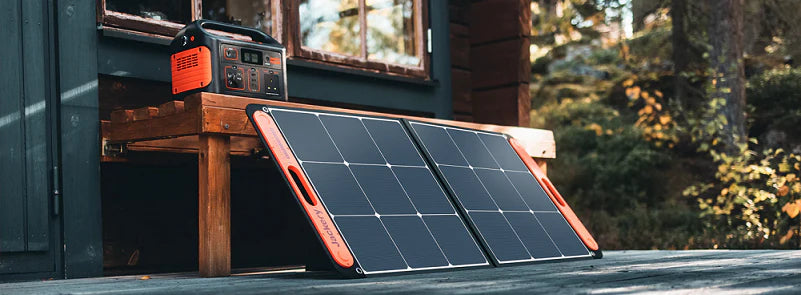Portable solar generators and suitcase generators are more than just trends—they’re perfect additions to the lives of those who want to stay powered up when far away from the power grid.
Suitcase generators are a hit at home because they’re compact, quiet, and perfectly handle power outages or grid hiccups. Similarly, portable solar generators are gaining traction for their eco-friendliness, helping people break away from the chains of traditional power outlets—especially while on the go.
Imagine a peaceful camping trip to North Yorkshire with a portable generator that keeps your devices charged and your camp lit. If that sounds like an appealing idea, you’ve landed in the right spot. In this blog, we’ll dig into portable solar generators vs. suitcase generators to help you figure out exactly the one you need!
Understanding Portable Solar Generators
According to reports, 3.38% of Britain’s renewable energy is driven by the sun. [1] More people rely on solar power for both everyday use and outdoor expeditions, as this power source stands out as the ideal solution.
A portable solar generator is a device that uses solar panels to generate electricity, especially in situations without power. This type of generator includes key components such as solar panels, portable power stations, and inverters.
However, it’s worth noting that not all types of solar generators are suitable for every situation. To make it simpler, let’s dig deeper into the concept of portable solar generators and understand how they’re making life way more convenient.
1. How Portable Solar Generators Work
Their working principle is pretty straightforward: converting energy from the sun into electricity and storing it in the battery until required.
Once the solar panel captures the sun’s energy, it converts the power into DC through the photovoltaic effect and sends it to the charging controller. This regulates the flow of electricity and charges up the battery.
The battery then holds a good amount of electrical energy until it is needed. When using the stored power, the inverter steps in to convert the DC electricity from the battery into alternating current, which is the most compatible with household appliances.
2. Key Components of a Portable Solar Generator
A typical portable solar generator includes the following components:
Solar PanelsThese capture sunlight and convert it into electrical energy for power generation.
BatteryThe rechargeable battery stores the electricity generated by solar panels, so it can be used in times of need.
InverterThe inverter converts this stored DC power into AC power, which is what most households need to fulfil their power demands.
Charge ControllerThey control the voltage and current coming from the solar panels to protect the battery from overcharging.
3. Advantages of Portable Solar Generators
Portable solar generators provide a steady supply of power, helping you run devices for as long as you want. Whether you’re home or away, these generators add to your convenience. Here’s a rundown of their benefits:
Eco-friendliness and Zero EmissionsWith a portable solar generator, you don’t have to worry about harmful emissions that generate carbon footprints. Since they operate entirely on solar power, they’re 100% eco-friendly, making them a top choice for most people in Britain today.
Silent OperationUnlike traditional noisy generators, a portable power station UK runs quietly. This makes them a top choice for indoor settings or anywhere where noise causes disruption. With them, you can enjoy consistent power without the hum of a noisy generator.
Lightweight and Compact DesignWhether you’re heading out to camp or need some power on the go, portable solar generators have you covered. They’re designed to be compact, lightweight, and easy to carry to offer a hassle-free experience for Britain relying on them.
Low Maintenance RequirementsSince portable generators don’t have as many moving parts as traditional ones, there’s less that can go wrong with them. Typically, cleaning up solar panels and checking the battery are all that’s needed to keep your appliances running smoothly.
Jackery’s Portable Solar Generator Lineup
There’s no denying that the potential of portable solar generators in the UK is impressive. To make a reliable and simpler choice for you, here are two recommended options that cover almost all your energy needs in a compact power pack.
According to different power needs in outdoor or home activities, Jackery steps in with the versatile portable solar generator lineup. Our products come in different ranges and are designed to meet your unique needs, so power outages no longer frustrate you. Let’s dig in.
1. Jackery Solar Generator 300 Plus
The Jackery Solar Generator 300 Plus is designed to give Britain an entry-level solar power experience. With a 288Wh LFP battery, it packs just enough juice to keep your essential devices running smoothly. This solar generator features a 300W pure sine wave AC output, so you get sufficient power, making it perfect for sensitive electronics like laptops and smaller appliances.
Jackery Solar Generator 300 Plus outshines others with multiple charging options: solar panels, an AC outlet, or a carport. This makes the generator a dependable source for camping expeditions, road trips, or as a backup power source at home.
It comes with innovative ChargeShield Technology, which enhances the battery’s lifespan by 50%. Hence, even at a high temperature of 45 °C, you can still charge your generator within as few as two hours.
2. Jackery Solar Generator 500
Compact yet packing more power, the Jackery Solar Generator 500 is a standout choice for a reliable off-grid power supply. With an impressive 518Wh lithium-ion battery, it provides a longer battery life. Its 500W pure sine wave AC output ensures that your devices receive stable and reliable power, which is ideal for running more demanding appliances or charging multiple devices simultaneously.
What’s more, the Jackery Solar Generator 500 features fast charging capabilities. It can be fully charged through an AC outlet in 7.5 hours. This means you don’t need to be around as long to get back to full power. So, whether you want a robust power backup at home or on a longer camping trip, this solar generator is worth the investment.

How Jackery Solar Generator 300 Plus and Jackery Solar Generator 500 Cater to the Outdoor Scenarios
While choosing between the Jackery Solar Generator 300 Plus vs. Jackery Solar Generator 500 totally depends on your power needs while on the go, both make fantastic outdoor companions. For instance, their lightweight and portable designs make them easy to carry almost anywhere, from camping trips and hikes to even cruising around the UK waters.
With both of these solar generator models from Jackery, you can rest assured that your essentials are charged during emergencies or longer trips.
Another common feature between these two is their silent operation and solar charging. This is especially desirable when you’re out to get some air and freshen up. No matter if it’s your camera, drone, laptop, or LED, these Jackery’s generators take care of them all, making off-grid living more convenient than ever.
Understanding Suitcase Generators
The suitcase generator is also a portable power generator, mainly used to provide temporary power support or emergency power supply. The working principle of the suitcase generator is mainly based on the combustion mechanism of the internal combustion engine and the principle of electromagnetic induction.
A suitcase generator typically contains a small internal combustion engine (such as a gasoline or diesel engine) that burns fuel to generate mechanical energy, which is then converted into electrical energy through a generator.
Suitcase generators are widely used in situations that require a temporary power supply, such as construction sites, outdoor activities, emergency rescue, etc. Its portability and flexibility make it very practical in these situations.
1. Common Types of Suitcase Generators
Here are some of the most common types of suitcase generators:
Small Diesel GeneratorsA small diesel generator is powered by diesel fuel and is known for its high efficiency. Diesel fuel has a high energy density and can provide stable power output for a long time. In addition, the design of such suitcase generators is usually robust and can adapt to harsh environmental conditions, such as construction sites or emergency rescue sites.
Small Gasoline GeneratorsPowered by gasoline, a small gasoline generator is generally lighter and more portable than diesel generators. Striking the right balance of power and portability, they’re perfect for casual or short-term power requirements, such as when charging devices during outdoor activities.
2. Advantages of Suitcase Generators
If you’re wondering if suitcase generators are worth investing in, here’s a list of benefits that’ll help you make a decision:
Higher Power OutputCompared to portable solar generators, suitcase generators can provide a higher power output. This high-power output enables it to supply power to multiple devices simultaneously, making it suitable for more complex application scenarios.
Faster ChargingThe suitcase generator can immediately provide power and can be quickly charged after connecting the device without relying on a long solar charging process. This rapid response ability is particularly important in emergency situations.
Heavy-Duty ApplicationsDue to its high power output, the suitcase generator can support the operation of multiple devices simultaneously, making it suitable for heavy-duty applications such as supplying power to multiple power tools or household appliances at the same time.
3. Disadvantages of Suitcase Generators
Like most things, suitcase generators come with their own challenges, including:
Reliance on FuelDiesel or gasoline, a suitcase generator heavily relies on fuel to function. This means you’ll have to regularly refuel them and deal with hefty costs in turn.
Noisy OperationUnlike portable solar generators, these generators are pretty noisy when running. Plus, the noise may be especially annoying under heavy loads.
Emissions and Environmental ImpactsIf you’re environmentally conscious, you may want to think twice before investing in suitcase generators. Since they run on fossil fuels, they produce emissions and can have an environmental impact.
Regular Maintenance RequirementsIn order to run efficiently, a suitcase generator requires regular maintenance. Hence, you’ll have to frequently check the oils, clean filters, monitor the engine, and even bear the hefty costs of maintaining them.
Key Factors to Consider Between Portable Solar Generators and Suitcase Generators
If you don’t know how to choose between a portable solar generator and a suitcase generator, here’s a rundown of the key factors to consider that’ll make it easier for you to choose:
1. Power Requirements and Intended Use
When choosing your generator, consider your appliances' power requirements and intended use.
For example, portable solar generators are suitable for providing power to low- to medium-power devices but are limited by weather conditions. The suitcase generator can provide higher power output but cannot operate when there is insufficient fuel.
2. Portability and Weight
While both generators are suitable for outdoor activities, it’s important to consider portability and your desired weight before purchasing. Suitcase generators are compact with handles, yet models with heavier wattage may be heavier.
On the contrary, portable generators are lightweight and more compact, making them perfect for accompanying you on the go. This means that for outdoor adventures like camping or hiking, a portable solar generator might be a better pick.
3. Environmental Impact and Sustainability
With the growing awareness of reducing carbon footprints, it’s important to consider the sustainability of your generators. Portable solar generators are 100% eco-friendly, relying entirely on solar energy for their operation. This reduces reliance on fossil fuels, ultimately minimising their environmental impact.
However, suitcase generators run on gasoline, diesel, or propane, all of which produce harmful emissions. While they’re robust and reliable, suitcase generators may not be suitable for outdoor leisure use.
4. Noise Level and Operation
Another factor to consider when opting for any of these two generators is the noise level during operation. Portable solar generators are generally much quieter and help you enjoy a peaceful environment without noise disruption.
However, suitcase generators might be noisy, especially under heavy loads. If you desire quieter operations, portable solar generators might be the right choice for you.
5. Maintenance and Fuel Requirements
Lastly, and most importantly, it’s crucial to know the maintenance needs and fuel requirements of your generator well before the purchase. If you’re comfortable with regular maintenance tasks, a suitcase generator might be suitable. Conversely, portable solar generators generally require minimal maintenance.
More so, a suitcase generator requires a constant supply of fuel, which means spending hefty amounts on refuelling it. Portable solar generators, on the other hand, only depend on solar energy, making life easier for you.
Wrapping Up
Choosing between portable solar generators and suitcase generators doesn’t have to be complex. Begin by considering your power needs and other factors to consider, as we’ve outlined above.
Suitcase generators offer high wattage for heavy-duty applications but come with challenges like noisy operation, regular maintenance, and more fuel needs. Portable solar generators, on the other hand, are ideal for lower power needs, but they are lightweight, eco-friendly, and much quieter.
So, if you’re looking for sustainability and ease of use, a portable solar generator like those from Jackery is a great choice. We pack power, portability, and eco-friendliness into all our models, making them your ultimate travel partners. Visit our website to choose one!
References
UK ENERGY IN BRIEF 2023. Available at: https://assets.publishing.service.gov.uk/media/664c827ff34f9b5a56adcb5d/UK_Energy_in_Brief_2023.pdf (Accessed: 15 August 2024)







































































































